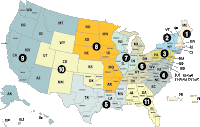In granting Salgado’s motion for summary judgment, the trial court found that "[s]ections 627.730-7405, Florida Statutes (2003), when viewed in pari materia with § 627.728, Florida Statutes (2003), are in derogation of Defendant’s common law right to unilaterally rescind personal injury protection coverage for material misrepresentation; [and] as such, Defendant’s common law right to rescind personal injury protection coverage is abrogated by the Florida Statutes." The trial court further reasoned that, because section 627.736(9)(a), Florida Statutes (2003), mandated United to report cancellation or nonrenewal of PIP coverage to the Department of Highway Safety Motor Vehicles within forty-five days from the effective date of cancellation or non-renewal, United did not comply with the statute when it cancelled Salgado’s policy retroactively to the date of inception. The trial court further concluded that the notice of cancellation did not comply with section 627.728, which required that notice of cancellation be given to the insured forty-five days prior to the effective date of cancellation. The trial court, therefore, found that Salgado’s policy was valid at the time of the accident on January 31, 2004. United appealed the decision to the circuit court sitting in its appellate capacity, and the circuit court affirmed without opinion.
"It is, of course, a general principle of statutory construction that the mention of one thing implies the exclusion of another; expression unius est exclusion alterius. Hence, where a statute enumerates the things on which it is to operate, or forbids certain things, it is ordinarily to be construed as excluding from its operation all those not expressly mentioned."
Following that principle, we must conclude that if the Legislature had intended to exclude no-fault insurance from Part II, Chapter 627, it would have included that type of insurance in the list enumerated in section 627.401.
In this case, the express language of section 627.401 directly refutes Salgado’s position that United’s right of rescission under 627.409 is abrogated by the Florida Motor Vehicle No-Fault Law. For this Court to conclude otherwise would be a usurpation of the legislative function. Because Florida Motor Vehicle No-Fault Law policies are not expressly excluded from Part II of Chapter 627, they are, therefore, governed by that part, including section 627.409.
***
We now address the trial court’s finding that because United’s notice did not comply with section 627.728,4 which required that notice of cancellation be given to the insured forty-five days prior to the effective date of cancellation, the policy was valid at the time of the accident. The trial court’s finding in practice, would require that an insurer undertake a forty-five day investigation period after the effective date of such a policy in order to ascertain if the application contained any material misrepresentations. That finding, however, is contrary to well established law that "an insurance company has the right to rely on an applicant’s representations in an application for insurance and is under no duty to further investigate."...While it may be better public policy to require such a practice, it is not the province of this Court to effectuate such a policy change by way of case law.Additionally, this Court, along with others, has stated that an insurer’s denial of coverage under section 627.409 is "a viable defense even in the absence of effective cancellation."
As such, we conclude that an insurer’s failure to rescind a policy in accordance with statutory cancellation procedures does not preclude or abrogate an insurer’s ability to void the policy ab initio pursuant to section 627.409.
***
We turn now to Salgado’s argument that section 627.736(9)(a) abrogates an insurer’s right to rescission.
Based on the plain and unambiguous language of this section, we find Salgado’s argument unpersuasive...First, we find that section 627.736(9)(a) applies only to "renewal[s], cancellation[s] or nonrenewal[s]." While section 627.728(1)(b) defines the term "renewal," which is not applicable in this case, the term "cancellation" is undefined by chapter 627.
Because "the effect of a rescission is to render the contract abrogated and of no force and effect from the beginning," we conclude that section 627.736(9)(a) does not apply where – as here – the policy was rescinded as opposed to cancelled. When a contract is rescinded, it is as if the contract never existed in the first place. Accordingly, as the policy never came into existence, there was no contract for United to cancel.



1 comments:
I think I will try to recommend this post to my friends and family, cuz it’s really helpful.United Auto Insurance
Post a Comment